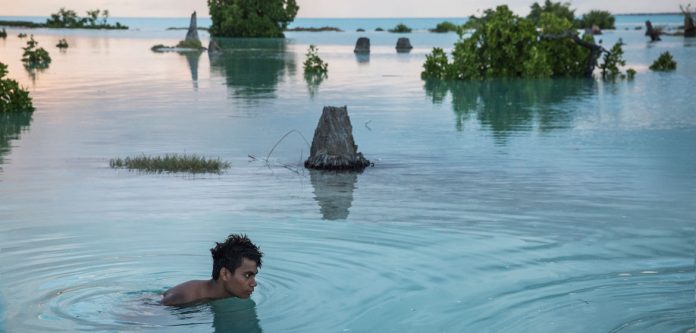A new World Bank study examining the potential legal implications of sea-level rise on the maritime and legal rights of Pacific Island nations provides a pathbreaking review of the key legal questions and highlights that some international legal conventions may need to be reconsidered.
The new study, Legal Dimensions of Sea Level Rise: Pacific Perspectives, sets out the latest developments in international law to support policy considerations now underway in the Pacific and around the world. The report assesses how states would defend their existing territories and marine resources in accordance with international law when dealing with rising seas and land loss.
Furthermore, the report considers more existential questions for these countries such as whether statehood could continue if a nation were to become uninhabitable and legal rights and implications for citizen mobility if people are to be relocated.
Global mean sea-level will continue to rise throughout the 21st century due to the effects of climate change. In many areas, this will result in increased coastal flooding, storm surges, cyclones and even land loss. In small Pacific atoll nations, these impacts are expected to be more severe, with entire islands at risk of becoming uninhabitable. Along with the loss of homes and resources, the loss of land to rising seas would also have profound impacts on countries’ legal and maritime rights.
“The impacts of climate change are a global concern, however the loss of territory is a real and clear threat to the very existence of Pacific states, and particularly atoll nations,” said Benoit Bosquet, World Bank Regional Director for Sustainable Development in East Asia and the Pacific. “Such impacts would be unprecedented and create similarly unprecedented legal questions. We hope this work will provide useful analysis for Pacific nations and small island states facing these unique and challenging questions.”
The Pacific region has been a leader in considering policy and legal options in the face of sea-level rise, most recently with the Members of the Pacific Island Forum endorsing the Declaration on Preserving Maritime Zones in the Face of Climate Change Related Sea Level Rise in August 2021.
While the report highlights a range of legal and policy tools available to island states, a re-examination of the current paradigms of international law are also suggested. One example is clarifying how territorial and maritime entitlements – including to resources – can be preserved in the face of rising sea levels. Something the Pacific Islands Forum’s recent Declaration on Preserving Maritime Zones has just set out to do.
“As the impacts of climate change are being felt, it is clear that adaptation alone will not be sufficient for small island states such as the Marshall Islands,” said Acting RMI Chief Secretary, Catalino Kijiner. “This work will be helpful in informing government decision-making in the context of rising sea levels, and will help direct how the international community can best provide island and atoll nations with the support we need to address these unprecedented challenges.”
The study, authored by David Freestone and Duygu Cicek, has been developed as part of the World Bank’s work on Building Resilience in Pacific Atoll Island Countries with financing from the Global Facility for Disaster Reduction and Recovery (GFDRR).
The World Bank works in partnership with 12 countries across the Pacific supporting 87 projects totaling US$2.09 billion in commitments in sectors like agriculture, health, education and employment, climate resilience and adaptation, energy, fisheries, rural development, economic policy, macroeconomic management, aviation and transport, telecommunications, and tourism.
SOURCE: WORLD BANK/PACNEWS














